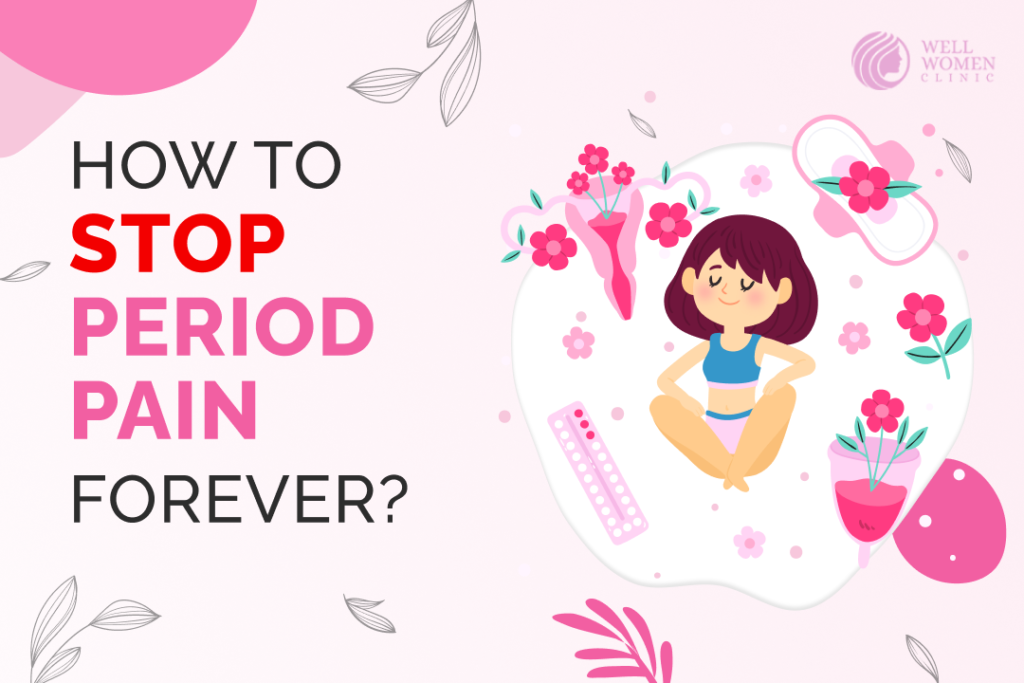Premenstrual and menstrual discomfort might occur. Mild pain to severe cramps is possible. Period pain is treatable.
To permanently stop period pain, try treatment for period cramp relief or home care choices, especially if an underlying health condition causes period discomfort.
The endometrium thickens during a woman’s menstrual cycle to allow pregnancy. Menstruation occurs when the body removes this lining owing to a lack of pregnancy.
Uterine muscles tense and relax irregularly to remove endometrial. This movement allows the uterine lining to pass through the cervix and vagina. Uterine contractions can be painful. Mild to severe cramps can occur. Dysmenorrhea is menstrual pain.
Health issues might induce menstrual pain. When these problems are treated, period discomfort may reduce or stop.
Depending on the source, period discomfort may be permanently stopped. Those with heavy painful periods should consult their doctor about therapies.
Methods that work for some women may not work for others. A doctor may offer therapeutic therapy to permanently stop period pain.
The following sections detail specific therapies.
6 Ways to stop period cramps
Contraception Hormones
- Oral tablets, injections, and implanted devices are hormonal contraceptives.
The Pill
- Oral contraceptives use hormones to prevent ovulation. Two types of oral contraceptives exist:
- The combination tablet contains oestrogen and progesterone. Hormones affect menstruation.
- Progesterone-only tablets. Those who can’t take the combo pill may get these.
- Oral contraceptives can stop period pain. Effective oral contraceptives must be taken daily.
- Oral contraceptives may induce lighter, more regular menstruation. Oral contraceptives can suppress periods entirely if they don’t stop period pain. Trusted
Underlying Health Issues
Sometimes an extreme period of pain has a medical cause. In certain circumstances, medication may ease period pain.
Endometriosis
Endometriosis or Pelvic Pain develops when uterine tissue grows outside the uterus. This tissue bleeds and swells during menstruation.
Endometriosis causes:
- Menstrual cramps
- Lower back, pelvic pain
- Sex pain
- Constipation pain
- spotting
- Infertility
- Constipation
Endometriosis is treated by:
- Oral contraceptives or IUDs
- Endometriosis implant surgery
- GnRH agonists stop ovulation hormone production.
Fibroid Uterus
Uterine fibroids form from muscle and fibrous tissue. Common. Fibroids are usually noncancerous and can be as big as a grapefruit.
Although most fibroids are symptomless, they can cause:
- Cramps
- Bruising
- Lower-belly fullness
- Abdominal swelling
- Urinating frequently
- Sex pain
- Infertility
- Pregnancy, labour problems
The Treatment
A doctor may use:
- NSAIDs
- Contraceptives
- GnRH-agonists
- Fibroid surgery
- Hysterectomy, uterine removal
Apart from the above-mentioned ways, one can also ease the period of discomfort through:
- Heat pads
- Bathing or showering
- Rubbing softly
- Practicing moderate yoga or Pilates
- Stretching
A doctor might offer many treatments to permanently stop period pain. If a woman has significant period pain or suspects underlying health issues, she should see a doctor at a private gynaecology clinic in London for treatment for heavy painful periods.





